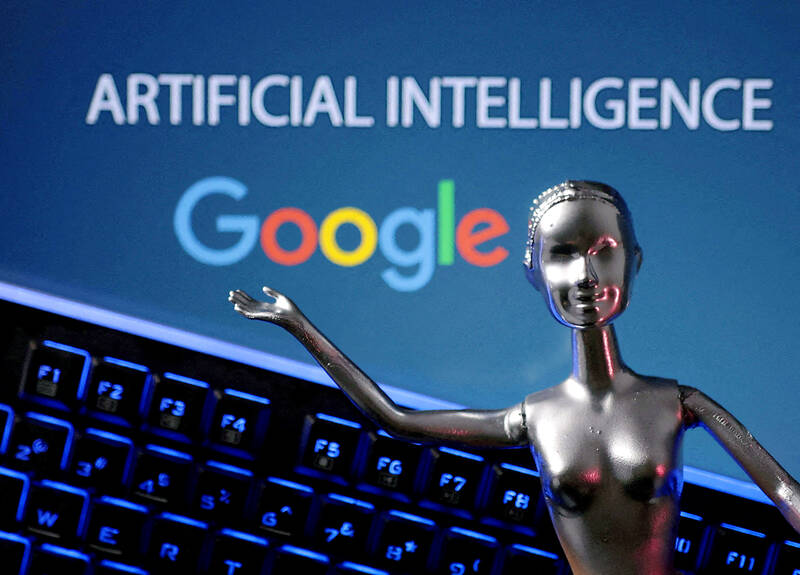AI could harm the health of millions and pose an existential threat to humanity, doctors and public health experts have said as they called for a halt to the development of artificial general intelligence until it is regulated.
Artificial intelligence has the potential to revolutionize healthcare by improving diagnosis of diseases, finding better ways to treat patients and extending care to more people.
But the development of artificial intelligence also has the potential to produce negative health impacts, according to health professionals from the UK, US, Australia, Costa Rica and Malaysia writing in the journal BMJ Global Health.

Photo: Reuters
The risks associated with medicine and healthcare “include the potential for AI errors to cause patient harm, issues with data privacy and security and the use of AI in ways that will worsen social and health inequalities,” they said.
One example of harm, they said, was the use of an AI-driven pulse oximeter that overestimated blood oxygen levels in patients with darker skin, resulting in the undertreatment of their hypoxia.
But they also warned of broader, global threats from AI to human health and even human existence.
AI could harm the health of millions via the social determinants of health through the control and manipulation of people, the use of lethal autonomous weapons and the mental health effects of mass unemployment should AI-based systems displace large numbers of workers.
“When combined with the rapidly improving ability to distort or misrepresent reality with deep fakes, AI-driven information systems may further undermine democracy by causing a general breakdown in trust or by driving social division and conflict, with ensuing public health impacts,” they contend.
Threats also arise from the loss of jobs that will accompany the widespread deployment of AI technology, with estimates ranging from tens to hundreds of millions over the coming decade.
“While there would be many benefits from ending work that is repetitive, dangerous and unpleasant, we already know that unemployment is strongly associated with adverse health outcomes and behavior,” the group said.
“Furthermore, we do not know how society will respond psychologically and emotionally to a world where work is unavailable or unnecessary, nor are we thinking much about the policies and strategies that would be needed to break the association between unemployment and ill health,” they said.
But the threat posed by self-improving artificial general intelligence, which, theoretically, could learn and perform the full range of human tasks, is all encompassing, they suggested.
“We are now seeking to create machines that are vastly more intelligent and powerful than ourselves. The potential for such machines to apply this intelligence and power, whether deliberately or not and in ways that could harm or subjugate humans, is real and has to be considered.
“With exponential growth in AI research and development, the window of opportunity to avoid serious and potentially existential harms is closing.
“Effective regulation of the development and use of artificial intelligence is needed to avoid harm,” they warned. “Until such regulation is in place, a moratorium on the development of self-improving artificial general intelligence should be instituted.”

On April 26, The Lancet published a letter from two doctors at Taichung-based China Medical University Hospital (CMUH) warning that “Taiwan’s Health Care System is on the Brink of Collapse.” The authors said that “Years of policy inaction and mismanagement of resources have led to the National Health Insurance system operating under unsustainable conditions.” The pushback was immediate. Errors in the paper were quickly identified and publicized, to discredit the authors (the hospital apologized). CNA reported that CMUH said the letter described Taiwan in 2021 as having 62 nurses per 10,000 people, when the correct number was 78 nurses per 10,000

As we live longer, our risk of cognitive impairment is increasing. How can we delay the onset of symptoms? Do we have to give up every indulgence or can small changes make a difference? We asked neurologists for tips on how to keep our brains healthy for life. TAKE CARE OF YOUR HEALTH “All of the sensible things that apply to bodily health apply to brain health,” says Suzanne O’Sullivan, a consultant in neurology at the National Hospital for Neurology and Neurosurgery in London, and the author of The Age of Diagnosis. “When you’re 20, you can get away with absolute

May 5 to May 11 What started out as friction between Taiwanese students at Taichung First High School and a Japanese head cook escalated dramatically over the first two weeks of May 1927. It began on April 30 when the cook’s wife knew that lotus starch used in that night’s dinner had rat feces in it, but failed to inform staff until the meal was already prepared. The students believed that her silence was intentional, and filed a complaint. The school’s Japanese administrators sided with the cook’s family, dismissing the students as troublemakers and clamping down on their freedoms — with

As Donald Trump’s executive order in March led to the shuttering of Voice of America (VOA) — the global broadcaster whose roots date back to the fight against Nazi propaganda — he quickly attracted support from figures not used to aligning themselves with any US administration. Trump had ordered the US Agency for Global Media, the federal agency that funds VOA and other groups promoting independent journalism overseas, to be “eliminated to the maximum extent consistent with applicable law.” The decision suddenly halted programming in 49 languages to more than 425 million people. In Moscow, Margarita Simonyan, the hardline editor-in-chief of the